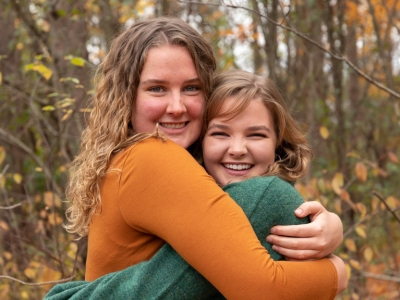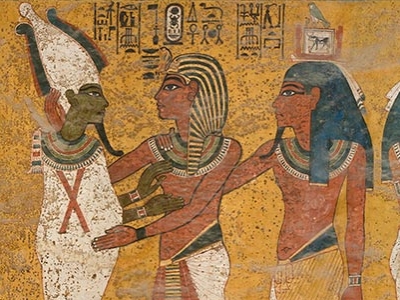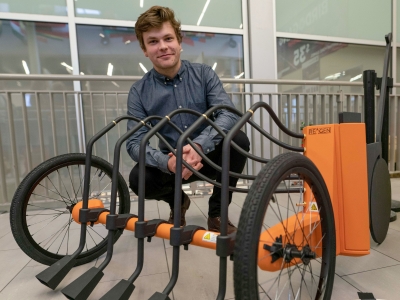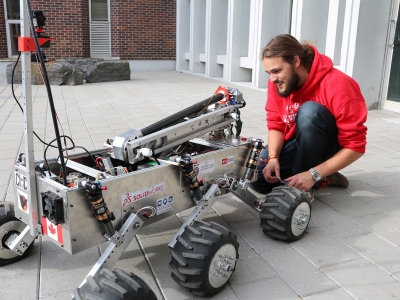By Alexandra Sebben
Empowering women and gender minorities – individuals whose gender expression differs from the presumed majority of the population – within the fields of engineering and information technology (IT) is an evolving conversation that extends well beyond the Faculty of Engineering and Design (FED) at Carleton.
Understanding that women and gender minorities often face added obstacles within engineering and IT, FED’s outreach team recently organized a panel for prospective students and their parents/guardians to hear how faculty and students at Carleton are committed to creating a transformational university culture where everyone feels they belong.
Hosted on January 30 and moderated by alumna Jasmine Shaw (BEng/16 – Biomedical and Mechanical Engineering, MASc/20 – Technology Innovation Management), the panel event featured Carleton’s Dr. Winnie Ye, Dr. Karen Taylor, Eli Goddard and Madeleine Root Bartley. Together, they spoke about diversity and acceptance at Carleton, as well as how students can develop their skills outside the classroom.
Acceptance at Carleton
Going from high school to university is one of the biggest changes young people go through in their lives. For many it’s a transformative experience and opportunity to meet people from around the world with diverse backgrounds and skills. With that can come feelings of self-doubt or questions about feeling accepted by others.
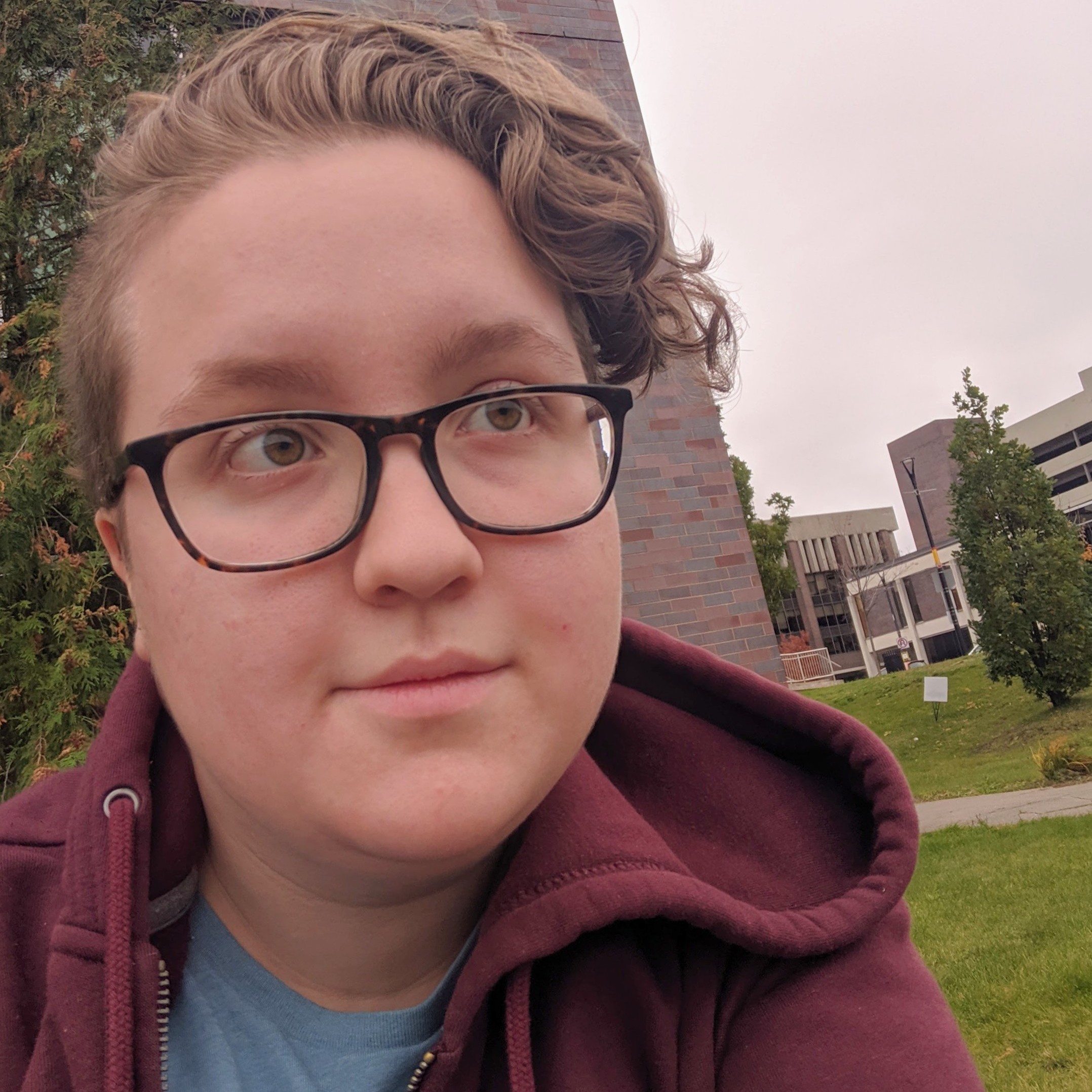
President, Carleton University’s Engiqueers, Eli Goddard.
“I’ve been extremely lucky to be surrounded by people in the Carleton community who respect me,” said Eli Goddard, the President of Carleton University’s Engiqueers society for LGBTQ+ engineering students.”
Eli says that they have met people at Carleton who have never met someone else who is genderqueer before, but the diversity of the community allows for unique voices, which opens others up to accepting things outside worldview.
Winnie Ye, a professor with Carleton’s Department of Electronics, says that as a faculty member who has worked for the university since 2009, Carleton has done a lot of groundwork to promote an inclusive culture for students and provide them with a safe place to learn and express themselves. She says that at the departmental level a lot of work is spent nurturing relationships with students outside the classroom. “As the only female faculty member in the department I spend time reaching out to female students and offering them mentorship opportunities as well as providing those who need guidance during difficult times,” Ye says.

Professor, Carleton’s Department of Electronics, Winnie Ye.
“For those who choose to study with Carleton, know that that types of informal mentorship opportunities are always welcome. It’s as easy as reaching out to any faculty member and they will be happy to help you solve any question or concern you may have.”
Karen Taylor, an instructor with Carleton’s Department of Mechanical and Aerospace Engineering, echoed these thoughts and discussed how important it is to help students feel safe and comfortable in and outside the classroom in order for them to thrive. In the current online learning environment, due to the COVID-19 pandemic, she highlighted how it can be tricky to foster an inclusive space, but there are ways she has been able to navigate this.
During live teaching sessions it’s important that conversations and questions in the chat and students’ questions are respectful and make people feel safe,” says Taylor.
“I encourage both students and teaching assistants to be mindful of other people’s boundaries and thoughts and I monitor the chats to ensure this is happening.”
A Connected Community
Engineering and IT are rewarding, yet challenging fields of study, which can result in steeper learning curves during the transition from high school to university. With that in mind, students can benefit from participating in extra-circular activities to build support networks, develop soft skills, and help set up their academic careers for success. With over 250 student groups and dozens specific to engineering and design, there’s something for everyone at Carleton.
Madeleine Root Bartley, the VP of Engineering for Carleton’s Women in Science and Engineering’s (CUWiSE) student group, reflected on becoming involved in extra-curricular activities during her second year. “I had to step outside of my comfort zone to join an intramural sports team and join a student group, but it was worth the risk. I got to meet people within my program, work on interesting projects and had a ton of fun throughout the process.” Bartley also reflected on how helpful being part of these activities were once the academic year started to pick up and she started to take on more stress.

VP Engineering, CUWiSE, Madeleine Root Bartley.
“Having a good support system that you can fall back on is key to thriving in STEM.”
As the Chair of Women in Engineering for the Institute of Electrical and Electronics Engineers (IEEE) Canada, and Faculty advisor for the award-winning IEEE Carleton group, Ye encouraged students to develop a strong support system during their first year. “Participating in professional development activities and networking opportunities is a great way to build your CV and grow your network of connections,” she says. “It also helps you build confidence and overcome shyness.”
Taylor noted that for some, finding and joining a connected community may follow a more traditional academic route by seeking and receiving support from FED-led initiatives. “This is an opportunity for students to further their relationships with faculty and staff members and set up your academic career for success,” she says.
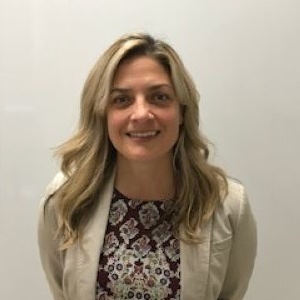
Instructor, Department of Mechanical and Aerospace Engineering, Karen Taylor.
“If ever students are unsure what support systems are available to them, simply ask as there is a good chance we have something for everyone here at Carleton.”
Eli Goddard shared final reflections on what it feels like to be an engineering student at Carleton, noting that “engineering is a mountain we’re all climbing together. Everyone is part of this tight-knit community and there’s a shared sense of accomplishments.”
Friday, March 5, 2021 in Alumni, Feature Stories, Undergraduate, Women in Engineering
Share: Twitter, Facebook
